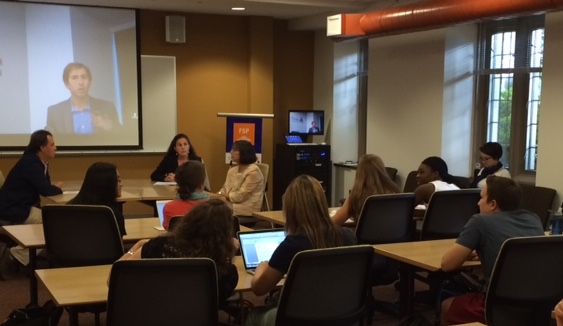When Jenni Owen took a survey of recent headlines in education, she found some articles trumpeting support for Common Core and others claiming that support for the program was dwindling. She found headlines on education funding, on higher education issues, and still others addressing issues of teacher quality.
Taken together, the headlines paint a picture of a complex system that Owen, the director of policy initiatives at the Center for Child & Family Policy, described as fragmented and one that most people don’t really understand. But at the same time, she said education is a shared experience for all Americans because “we’ve all been somewhere in education system, so we all think we know something about it.”
Former Department of Education official Mike Lamb (T ’05) agreed that education is a complex issue, partly because of the shared power between local, state, and federal levels of government. So when it comes to education and elections, they both agreed there’s a lot to consider.
Speaking at the latest installment of the Duke Election Series Owen and Lamb, who were also joined by Barbara Jentleson, assistant professor of the practice for education, gave audience members some tips for evaluating candidates’ stances on education issues.
First, Owen encouraged audience members to look at the state government. “Is yours a state with strong or weak local control?” she asked, noting that at least one audience member indicated they were unsure.
Next, Lamb said to consider whether a candidate uses phrases like “expense” versus “investment” to describe funding for education. It could be a signal for how they see policy recommendations playing out post-election.
And then, look at the issue as a whole. “Is the candidate using education as a wedge issue, to drive parties apart?” Lamb asked. “Or, are they using it to generate substantive debate? Are they asking whether their policies will be substantively best for the kids?”
And that, Jentleson said, should be the question at the heart of any debate around education.
The election series continues next Thursday, as Peter Feaver, professor of political science and public policy, and Paul Teller (T ’93), chief of staff for Senator Ted Cruz (R-TX), take on the issue of international relations. Feaver, a veteran of two administrations, will be speaking from the Forum for Scholars and Publics, while Teller, a fourteen-year veteran of Capitol Hill, joins in from Duke in Washington.
Click here for the full schedule and to register for next week’s installment.
